“….the personal is political.” Transcript of speech given by Margie Adam on June 19, 1999.
I have been meditating on the notion that the personal is political. This is an idea that was given to the world by the North American Women’s Liberation movement thirty years ago. I think it means that imbedded in each woman’s personal experience is a reservoir of power. And when we tell our stories to each other, when we share our experiences, we perform a revolutionary act of empowerment. The personal is political.
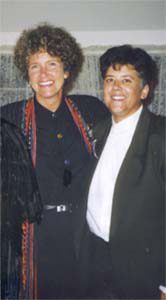
The first invitation I ever received to perform in public was made by Jeanne Cordova of the Lesbian Tide magazine in Los Angeles after she heard me sing at an open mike at Kate Millet’s Sacramento Women’s Music Festival. I told her I wasn’t a performer. I told her I wasn’t political. She said just come and sing your songs at our benefit. Come and sing your woman’s life for us. I went to LA. I sang songs about my life at a benefit for this lesbian feminist magazine. A woman invited me to perform at a talent show being organized. A feminist lesbian talent show. I said I wasn’t a performer. I told her I wasn’t political. She said come sing to us about your woman’s life.
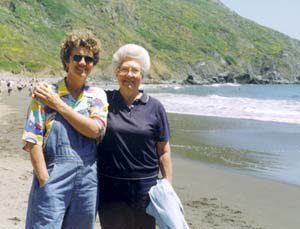
The personal is political. I am accompanying my mother on a long and painful journey that is Alzheimer’s disease. And everywhere I turn for medical care, for legal advice, for social services, for financial planning, I am finding strong women in charge. These women, lawyers, medical professionals, psychiatrists, bankers are the women we in Women’s Music sang to at the Women in the Law Conferences, the Women in Psychology conferences and at NOW Conferences 25 years ago. Only then, these women were college students, or they were new in their professions. Women’s Music was the fuel that kept women like these going when professors and bosses said women just weren’t good at arguing legal concepts, women couldn’t be doctors and psychologists because people wouldn’t feel safe being treated by a female, women couldn’t be bankers or investment advisors because people wouldn’t feel comfortable allowing females to handle large sums of money.
My mother encouraged me to play the piano. She was a pianist and organist for the church. She had hoped to be a concert pianist but was discouraged by her teachers. Men concertize. Women teach. I was two years old when I began to play the piano. I took lessons from the age of five. I began writing music when I was 15….fell in love with a girl and had to tell her. Had to somehow communicate to her how deep my feelings were. There were no love songs woman to woman that I knew of in 1965. No way to know how words would sound – woman to woman love songs. So I wrote my first piano solo, ‘Kathy’s Song.” The personal is political.
When I recorded my first album of piano music, Naked Keys, I took this musical idea and wrote a new piece called ‘From the Beginning”. It was no small thing to record this piano record in 1980. Some distributors thought all Women’s Music had lyrics. Otherwise why would you call it Women’s Music. Meanwhile, Kay Gardner was demonstrating with her gang, the New England Women’s Philharmonic that this was a limited view. Mary Watkins was making clear with her jazz piano that Women’s Music was more than lyrics. Women with tools. Women playing instruments. Women NOT singing. Women WORKING with tools.
I released Naked Keys because I had to. I had been writing solo piano music-wrestling my Steinway to the ground for 15 years. I had a lot of music to share…. And women wrote me and said they played that album when their parents visited. Even if they had to de-dyke the house – even if they had to take down every poster, put away every book and move their girlfriend into the guest bedroom – they played my solo piano album Naked Keys at dinner. The personal is political.
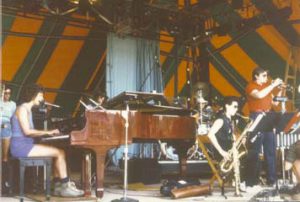
Last night in San Francisco – I ran into five ‘goth” kids with dyed black hair, eye-liner, bolts and piercings all over their faces – making noise, taking up space – getting a lot of attention… It reminded me of what it was like in 1974 when about 800 of us showed up at the university campus in Champaign-Urbana, Illinois for the First National Women’s Music Festival. People stopped and stared to see so many women unbound and delirious with finding each other and our music. Women-loving women were visible. In large numbers. Together. A female presence. A Feminist presence. A lesbian presence.
When we began calling what we were doing Women’s Music, we were creating a space for women that had never existed before. There had never been concerts produced entirely by women, with sound and lights run by women – where all the musicians were women and the music was written by women. We came together in this woman’s space to be together – to feel the power and beauty and possibility in this woman-loving space. As our events moved out of church basements and multi-purpose rooms and performers in Women’s Music began to fill large halls, auditoriums and ballrooms at national women’s conferences, we were creating and claiming a space for women that had never existed before.
Today we have The Lilith Fair (which I think is kind of like the Women’s section at Barnes & Noble compared to a feminist bookstore), The Three Divas in Opera concerts, The Women in Country TV Specials and on the radio we hear back to back female vocalists-unheard of in 1974 – the first year of this festival. These accomplishments belong to the Women’s Music Movement. The mainstream music careers of several out lesbians and not-so-out lesbians stand on the shoulders of our pioneering work.
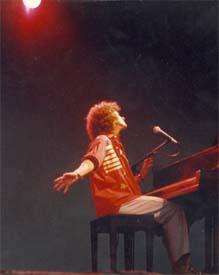
Kristin Lems produced that first festival and several after that. She set a standard for inclusiveness – for diversity – that has continued to be a primary value in the on-going movement of Women’s Music. There were women of color on that first national festival stage, working class women, women from the union movement, old women, young women, Vicki Randle, Ginni Clemmens, Woody Simmons, Robin Flower, Kay Gardner, Meg Christian, Elizabeth Cotton, Barbara Dane, Cris Williamson, the New Harmony Sisterhood, many others. Some of us are here this weekend – We are still here 25 years later.
I had just written this song when I performed at the first National Women’s Music Festival and the audience began to sing with me at the second chorus. I could hardly find breath to sing I was so undone by the experience. I laughed out loud for the sheer joy of being welcomed into the lives of women – all of us singing together in one voice. My heart still flutters each time you all join me in “Best Friend – The Unicorn Song.”
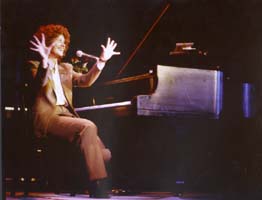
Barbara Dane, the folksinger/songwriter was at that first festival and she had her own record company, Paredon Records. She ran it, she recorded on it. Imagine a woman owning her own recording company. So did a few other women. Marian McPartland the pianist. Betty Carter, the jazz singer. A fledgling women’s recording company was there in Champaign – Olivia Records – promoting their first single 45 with Cris on one side and Meg on the other. They were looking for distributors. Distributors like Terry Grant who formed Goldenrod distribution and Laurie Fuchs who formed Ladyslipper Music – both of whom are here this weekend 25 years later. We are still here 25 years later.
Within six months, Lisa Vogel and her sister Kristi were at the Boston Women’s Music Festival where Cris, Meg, Holly, Kay and I appeared and they said to each other – we want to have this in Michigan.
What I’m talking about is context. Creating a context. Creating a Woman’s space with music out of which emerges a context. I could imagine starting a record company called Pleiades Records because Barbara Dane did. Because Betty Carter did. Because the women of Olivia records did. Many many women have their own record companies today because of this imagining. Lisa and her friends could imagine creating the Michigan Womyn’s Music Festival because the women in Boston did. Many festivals have grown up since then because of this imagining. Women imagined being agents, sound engineers, producers, radio programmers, distributors. Today there are countless women working in all areas of the music business because of this imagining.
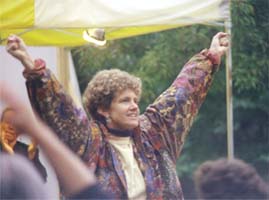
Only in a woman-hating culture could the vast accomplishment of Women’s Music be distorted/discounted and hidden from an audience who would surely enjoy it, an audience who would surely be healed and empowered by it. That is the hope of the Internet. Once again, Women’s Music is easily accessible to anyone who can type in margieadam.com or hollynear.com or sweethoney.com. My dream is that one day, all of us who continue to honor and celebrate Women’s Music in all its diversity will be linked to each other on the web so that if you can just find one of us, you can find us all.
The personal was political. I think it still is. How we live our lives is political – where we contribute our money and activist energies, how we support women’s businesses, how visible we are as feminists, as progressives, as women-loving women, as lesbians.
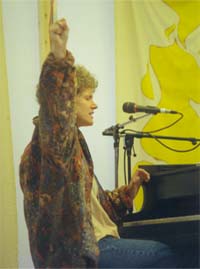
So many years have past. So many lessons learned. For those of us who have been around for the whole ride so far it’s really been something. And it really is something. My view is that the evolving reality of Women’s Music is inseparable from the on-going international movement for Women’s Liberation. Even as the musical styles change, even as the lyrics change and the hairstyles…. I think there is something called Women’s Music. And I don’t believe it’s just any music written by any woman. Whether written by an American, or Kosovar woman, a lesbian or a straight woman, a folksinger, pop singer, jazz pianist or symphonic composer, on some level the music and presentation will be pro-woman. The stance will be independent and life-affirming. It will be progressive. It will be a woman/or women singing/composing/playing their lives in music so that others are inspired and healed and energized.
What is known as Classic Women’s Music exists in roughly a ten year period from 1974-1984 – just like the civil rights movement is a part of the decade of the 60’s. And yet, that movement bubbled and roiled for decades before the 60’s – just as the impulse of strong women to work independently at the margins of the music business existed before 1974 and the first National Women’s Music Festival. Women like these were out on the edge: Malvina Reynolds, MaryLou Williams, Joan Lowe, Marilyn Reis, Maxine Feldman, Ronnie Gilbert.
The reason we still need Women’s Music 25 years later is the same reason we still need the Civil Right’s movement. Because the struggle is not over. Even as women have taken their place in the law, in medicine, in finance, in the music industry we all know the work is not done. I salute our foremothers, the women who went before, on whose shoulders we stand and I sit today….I salute the women who have moved on but who changed so many of us as they passed through – Meg Christian, Casse Culver, Willie Tyson, groups like Baba Yaga, Bebe K’Roche, Isis, Chevere, Deadly Nightshade, Sistah Boom, Sweet Charity, brilliant producers, agents, managers, technicians, visionaries all – I wish I could project every name on the wall behind me. It’s that I believe acknowledgment is finally the most important currency of exchange we who identify with the on-going feminist movement have to offer each other. We are the Women Who Dare.
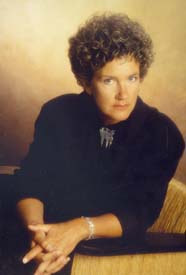
The work is not done. Women still seek out Women’s Spaces. We still love looking at each other, hearing ourselves in the music. A whole new generation of Women’s Music – ani difranco, Bitch and Animal, Zrazy, Laurie B, Maria Zemantauski, all artists on stage this weekend. These women are joining the context, the imagining. Women’s coffeehouses are once again being formed in Lexington, KY, San Francisco…. Women’s choruses are being organized. Regional and local festivals are springing up. Women like Tam Martin are out there booking artists like me and Cris and Tret and Ferron and Barbara Higbie and Teresa Trull. Tam is telling women who want to know how to produce one of us how to do it. She is helping women to imagine. Just in the last few years she’s helped bookstores and women’s choruses across the country to imagine bringing me to town. She’s helping colleges and universities to imagine bringing us to campuses to do workshops as well as concerts.
For my whole life in the music business, I have been asked by others, by the media in particular – why do I limit myself by calling what I do, what I write, Women’s Music? It’s accessible to any listener, they say. True, I say…
Here’s the answer. As long as there is woman-hatred sanctioned and systematically practiced all over the world, I will be one of the women visibly celebrating what Woman-loving sounds like. What it feels like. For my mother, for my sister, for my lover, Danielle, my friends, for the open-hearted men and boys I will be celebrating this woman-loving…but most of all for the young woman sitting at a piano somewhere right now on the edge of imagining a love song about her life. She is the Woman Of My Heart.